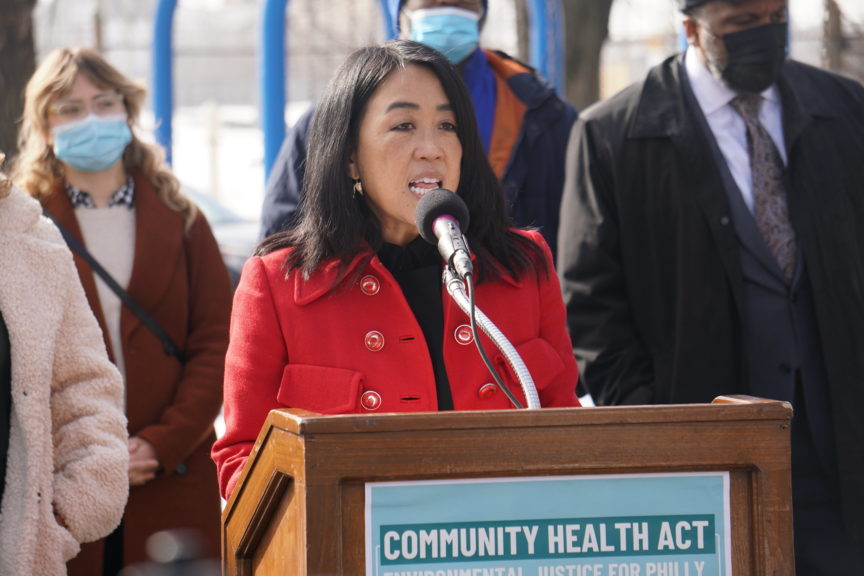Councilmember Gym, Environmental Advocates Announce Community Health Act to Address Environmental Health Disparities
PHILADELPHIA — Today, Councilmember Helen Gym (At Large) announced the introduction of the Community Health Act, landmark environmental justice legislation to better protect communities against the adverse health effects caused by pollution. The bill, written in partnership with legal and environmental advocates, establishes a clearer understanding of how new pollution actually impacts communities given existing pollution, demographics, and health characteristics. Rather than examining proposals in isolation, this process will consider the project in context and prevent concentrated areas from experiencing disproportionate harm from pollution.
“Philadelphia must play a stronger role in protecting the communities most likely to be harmed by pollution: low-income communities, immigrant communities, communities of color, and young people,” said Councilmember Helen Gym. “We are empowering the city to use their full authority to fully assess how new projects will impact our communities — ensuring new projects don’t compound harm or exacerbate the existing disparities.”
Under this legislation, the Department of Health will undertake comprehensive environmental justice mapping, taking into account environmental, climate, health, and demographic indicators. The city will identify environmental justice communities — areas within the city which bear an undue burden of pollution and adverse health impacts. New industrial projects within or adjacent to these areas which would meaningfully and adversely impact community health will undergo a cumulative impact analysis. This will allow the city to better understand how the new project would shape the existing community landscape, and empower the Department of Health to potentially require further mitigating steps before the project can proceed.
“This will make Philadelphia a national leader in advancing environmental justice and build a livable, breathable, healthy future for our city,” said Councilmember Gym. “Those most impacted by pollution have a right to be informed and should have a voice in decisions that affect their lives and communities.”
The Environmental Justice Advisory Commission, whose members were also announced on February 2, will play an integral role in guiding and informing the implementation of this legislation. The legislation also calls for community input in the development of the environmental justice maps and in conducting cumulative impact assessments.
“When we talk about environmental justice, we are by definition talking about racial justice, too,” said Councilmember Jamie Gauthier (3rd District). “For too long, minority communities have disproportionately carried the burdens of pollution and the negative health consequences that it creates. Councilmember Gym’s new legislation is a deeply important effort that will center equity, and will ultimately move us towards a future where all Philadelphians have safe and healthy communities where they can thrive.”
“Today we are here to say that your life and your health and the health of your families and friends, your lives matter,” said Ebony Griffin, Environmental Justice Advocate at the public Interest Law Center. “Communities of color and low income communities are most often those left dealing with the effects of environmental pollution and the life altering consequences of climate change. Regulatory and enforcement agencies reinforce this paradigm by failing to adopt equitable permitting mechanisms. Today Philadelphia says, no more and embraces its valuable and unique opportunity to provide a healthier environment for its residents. We commend the front line communities and residents who have been fighting for so long. We commend the City for taking action to support the health of its vulnerable communities.”
“As a Black woman from Nicetown, where one in three kids has asthma, including many of my own relatives, I know firsthand what the toll of environmental racism feels like,” said Councilmember Kendra Brooks (At Large). “And with so many of our community members lacking access to quality healthcare, the cumulative impact is devastating. We can no longer accept the status quo of working class Black people living shorter lives in toxic neighborhoods filled with pollutants—because it is literally killing us. I commend Councilmember Gym’s bold legislation, because it means that we can begin to tackle the legacy of redlining and environmental racism head-on.”
“Public health requires assessing ALL the layers of toxic burdens, not just one pollutant at a time,” said Frances Upshaw, Co-Founder, POWER Climate Justice and Jobs Team. “We support this legislation because it furthers racial and economic justice on a livable planet. This is a long-awaited step for the city to adequately protect public health.”
“The cumulative impacts legislation would help to remove the burden placed on communities to defend themselves, and empower the city government to do the job our tax dollars pay for,” said Shawmar Pitts, Grays Ferry resident and Strategy Organizer at Philly Thrive. “We hope that the cumulative impacts legislation would ease residents’ minds that after decades of harm from pollution, we won’t have to fight the same fight all over again, and our children won’t have to fight the same fight just to have a healthy environment.”
“Environmental justice guarantees every Philadelphian the fundamental right to live in a safe and healthy environment regardless of race, income, or ZIP code,” said Adam Nagel, Campaign Manager at PennFuture. “Councilmember Helen Gym’s Community Health Act is an important step in prioritizing the health and well-being of neighborhoods that have long suffered from harmful environmental policies.”
“This is long overdue given the City’s substantial asthma and cancer rates, particularly in lower income communities of color, and will be a great tool for communities attempting to prevent additional industrial air pollution from further deteriorating public health,” said Joseph Otis Minott, Esq, Executive Director and Chief Counsel for the Clean Air Council.
February is Environmental Justice Month within the City of Philadelphia.
###


